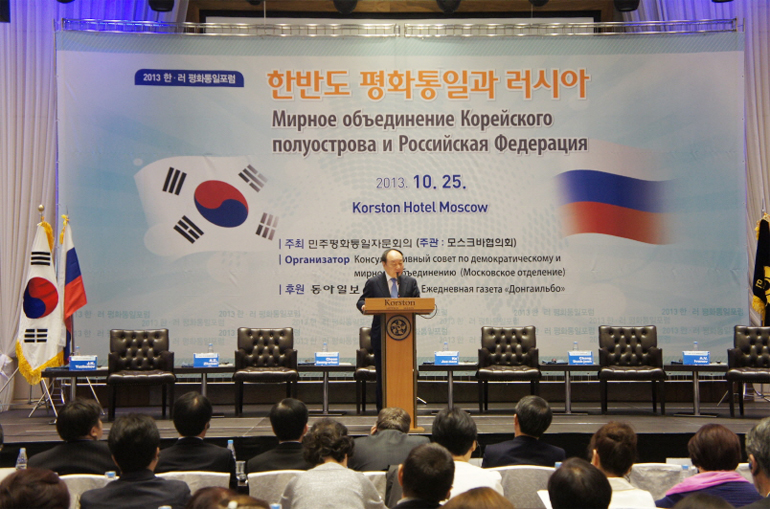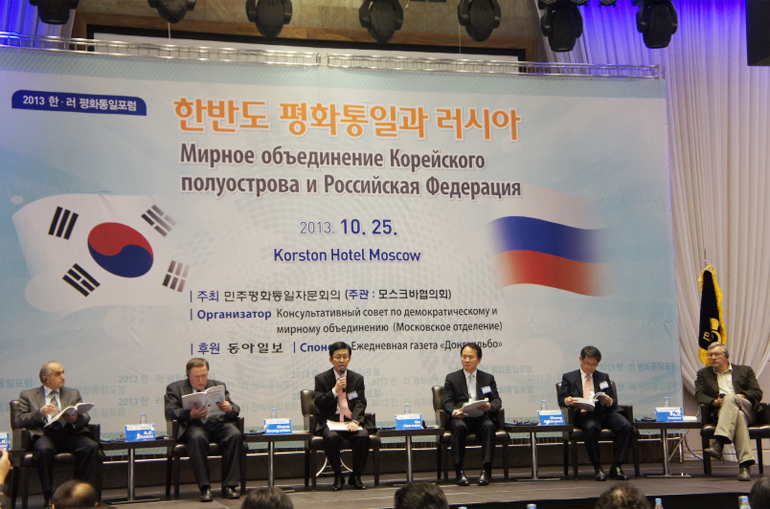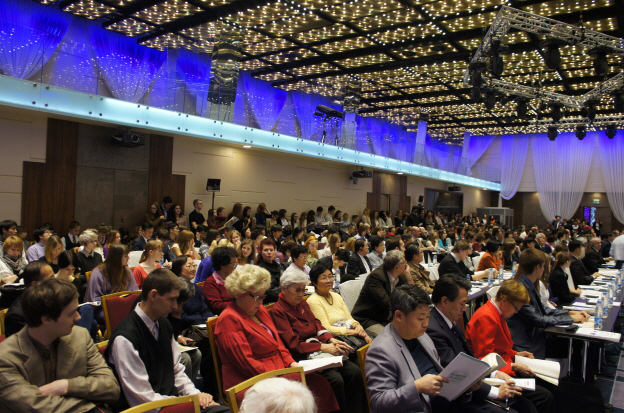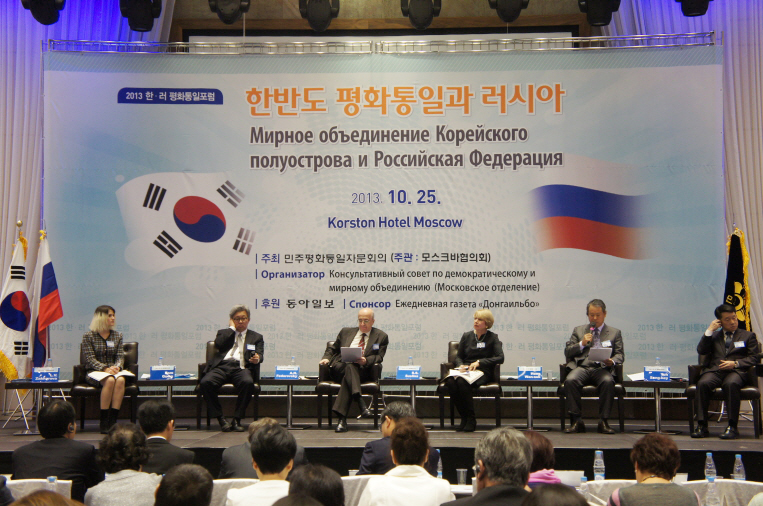NUAC (Executive Vice-chairperson: Hyun Kyung-dae, Secretary General: Park Chan-bong) held 2013 Korea-Russian Peaceful Unification Forum last Oct. 25 at Koroston Hotel in Moscow, Russia.
The cooperative mood between Korea and Russia has been enhanced by the first summit meeting between President Park Geun-hye and President Vladimir Putin during the G20 Summit Talks held last September in Saint Petersburg, President Park's suggestion of "Eurasia Initiative" last October 18 during President Park's visit to Russia, and President Putin's visit to Korea on November 13. Organized by the Moscow Municipal Chapter (Head: Kim Won-il) and sponsored by the Donga Daily, the Forum was held with such enhanced mood of cooperation between the two countries.
The following persons attended the forum: from the Korean side, director of the Korea Institute for National Unification, professor of Europe and Africa Study of the Korea National Diplomatic Academy, director of the Eurasia Study of Kookmin University, director of Russia Study of Hankuk University of Foreign Studies, director of Asia-Pacific Region Study Center of Hanyang University, and Unification Attaché of the Korean Embassy to Russia; from the Russian side; professor of the International Economy Dept. of the International Relations College of Moscow University (MGIMO), Institute of World Economy and International Relations (IMEMO), director of the Asia-Pacific Center, senior researcher and director of Korean Studies of the Far East Institute of Russian Academy of Science, professor of Moscow University, and senior researcher of the International Relations College of Moscow University (MGIMO).
Hyun Kyung-dae, Executive Vice-chairperson of NUAC, said in his keynote address that Korea-Russia cooperation would be further strengthened by the "Eurasia Initiative" proposed by President Park and "New Look East Policy" of President Putin.

Hyun Kyung-Dae, Executive Vice-chairperson, giving his keynote address
Hyun added that President Park emphasized the new initiative of energy cooperation in Northeast Asia including the Korean Peninsula and Russia in her address at the World Energy Conference (WEC) in Daegu last Oct. 16. According to him, Presidents Park and Putin expressed hope for the Trans Siberia Railway (TSR) and Trans Korean Peninsula Railway (TKR) during the summit talks in St. Petersburg last September, since the railways are the key project of the Eurasia Initiative.
He also noted that President Putin emphasized the importance of developing Siberia and Far East in his government speech in December 2012, and that the Far East Development Dept. was established in his 3rd-term cabinet to promote the New Look East Policy. The two Koreas and Russia share many areas of cooperation while the Eurasia Initiative proposed by President Park and New Look East Policy of President Putin are implemented, he said. He believes that it would be a good opportunity to strengthen cooperation between South Korea and Russia, have peace take root in the Korean Peninsula, and solve the issue of unification of two Koreas.
Experts in the unification of the Korean Peninsula and Korea-Russia cooperation made many proposals in the forum and agreed that the "Eurasia Initiative" of the South Korean government and "New Look East Policy" of Russia are substantially overlapped; thus leading to close bilateral cooperation between Moscow and Seoul.
The director of the Korea Institute for National Unification presented his view in the first session titled "Subjects to Realize the Idea of the Korean Peninsula Trust-Building Process," i.e., the denuclearization of the Korean Peninsula and the Korean Peninsula’s Trust-Building Process of the South Korean government, which aims at the common prosperity of South and North Korea, coincide with the geopolitical interest of Russia. Therefore, Russia can play positive and constructive roles in the course of realizing the Korean Peninsula’s Trust-Building Process.

Prof. Ko Jae-nam of the Korea National Diplomatic Academy presides over the first session of the Forum
"Trilateral cooperation between the two Koreas and Russia in the areas of constructing gas pipelines via North Korea to supply South Korea with Russian natural gas, constructing electric power transmission lines on the same route, and connecting with TSR-TKR are significant to Russia as well, because such projects are closely related to the Siberia-Far East development plan of Russia and integration with the Asia-Pacific Region," said Director Zebin, one of the panelists. He added that realizing the trilateral cooperation projects can strengthen the trust between South and North Korea and contribute to easing the tensions on the Korean Peninsula.
The second session proceeded under the subject of "Cooperation after the Summit Talks between Korea and Russia.” The panelists agreed that the "New Look North Policy" of Park's administration, which pursues regional cooperation with China, and the "New Look East Policy" of President Putin, which aims at developing Siberia and Far East and advancing toward the Pacific region, suggest the common interest between Korea and Russia in many parts. Seoul Summit Talks slated on Nov. 13 between President Park and Putin would discuss practical cooperation projects to reinforce the strategic partnership relationship between the two countries.
Prof. Svetlana Suslina, Moscow College of International Relations, presides over the second session
"North Korean leaders try to save themselves by making nuclear and missile shields, but we cannot expect such policy to be successful. The fact that as many as 23,000 North Korean refugees are staying in South Korea in the 2000s shows that the "iron curtain" of North Korea is rusting very rapidly. Soviet Union with its nuclear weapons and missiles could not stop the crisis and collision. Opening and reformation of North Korea are inevitable," the director said. According to him, considering the current trend, the unification of the two Koreas is not only inevitable but may also take place earlier than expected by South Korea and the surrounding superpowers.
Fedorovskiy said that South Korea and Russia have great potential in realizing the program of developing Far East and Siberia, and that mutual cooperation is needed in the areas of energy, agriculture, and cutting-edge technology. In this regard, Russia is required to modify its legal and administrative systems to attract investment from South Korea.
According to a professor of the Russia Language Dept. of Hanyang University, the confrontation concept of "USA-South Korea-Japan" versus "China-Russia-North Korea" should be abolished, and the opinions of China and Russia should be honored to find a solution that can satisfy common interest in the region.
Experts from the two countries expect the age-long wish to connect the Korean Peninsula and Siberia by railroad to be realized by the Park Geun-hye administration, which advocates the "Eurasia Initiative.” "Russia and Korea should consider strategic programs on grounds of more expanded mutual relationship. South Korea is negotiating the terms of the Free Trade Agreement (FTA) with China and Japan but should not exclude Russia from such framework of mutual collaboration," said Prof. Svetlana Suslina of the Moscow College of International Relations.
The forum provided the opportunity to let the Russian society know of the current situation of the Korean Peninsula and explain the unification policy of South Korea. "The Korean Peninsula Trust-Building Process is divided into humanitarian support, increasing exchange, and building an economic community, but they are to be made simultaneously, not in sequence,” the Director said. Prof. Andrey Ivanov of the Moscow College of International Relations said they positively support Park's government efforts to normalize inter-Korean relations. “Nonetheless, the Korean Peninsula’s Trust-Building Process carries characteristics as a "double-edged sword; therefore, the South Korean government should endeavor to build peace rather than pressuring Pyongyang systems," he said.

The forum, which provided simultaneous interpretation, attracted many overseas Koreans living in Russia and Russians
About 300 attendants including overseas Koreans living in Russia as well as students studying at the Korean Language Dept. of 7 major universities including Moscow University and interested persons from Korea and Russia paid keen attention to the forum. The event was covered by the major news media of Russia including "Voice of Russia" and Itar-Tass News Agency. In particular, the entourage of President Putin attended the Forum during his visit to South Korea to present their views on the inter-Korean policy of Park's government and its policy toward Russia. &reports by the Donga Daily and Yeonhap News Agency>
"President Park Geun-hye's ‘Eurasia Initiative’ and the ‘New Look East Policy’ of President Vladimir Putin meet in the Korean Peninsula’s Trust-Building Process. Cooperation between South Korea and Russia will provide new breakthrough to solve the nuclear problem of North Korea and development of Northeast Asia,” said Hyun Kyung-dae, Executive Vice-chairperson of NUAC, when he met the reporter last Oct. 27 in Moscow.
He attended the "Korea-Russia Peaceful Unification Forum" organized by the National Unification Advisory Council last Oct. 23~27 and sponsored by the Donga Daily and the Meeting with Overseas Koreans Living in Russia. "My role is to let the overseas Korean know about the national unification policy of the government and convey their opinions to the President,” said Hyun, one of the "7 Elders Club" for President Park.
According to him, it's time to re-evaluate the roles of Russia in relation to the issue of Korean Peninsula. Russia has been pulled backward compared with the USA. and China, but the influence of Russia on the unification of the two Koreas can never be ignored. “We expect that the support of Moscow for the unification and denuclearization on the Peninsula will be further strengthened as the South Korea-Russia economic ties increase,” he explained. Hyun mentioned the recent process of solving the chemical weapon issue of Syria. "The mediation initiated by Russia using diplomatic means was successful, objecting to the US and Europe's intended sanction by force. Russia can play similar roles in resolving the nuclear problem of North Korea,” he said.
He added that we need not be nervous about the frozen inter-Korean relations after the event of meeting separated families was canceled. "If our national security and defense are well established against the provocation from the North, it is North Korea which will be anxious and edgy about the deadlock between South and North," he stressed.
Source: The Donga Daily, Oct. 28, 2013





